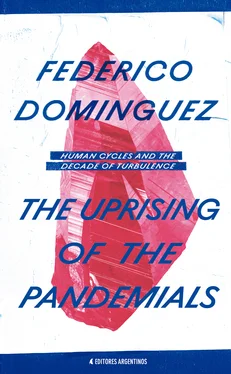I do not believe in radical solutions for dealing with inequality. I do not believe that a larger state or more taxes are the answer to recovering the ideal middle-class. These programs sound alright in speeches but they do not solve the underlying problem: the need for well paid, private-sector jobs, and reducing the cost of the meritocracy basket. The worst thing governments could do to face inequality is to introduce high income taxes, more public spending, and more regulation. This could lead to economic collapse and was one of the reasons why the cycle of prosperity that began after World War II came to an end. During the 1960s and 1970s, many countries established high-income tax rates, in some cases reaching 70%. This seriously affected investment, the innovation of economies, risk-taking, and the creation of new companies. This in turn contributed to the spike in inflation during the late 1970s. Ronald Reagan and Margaret Thatcher understood this problem very well and knew that with such high taxes, there would be no investment. They tackled the problem by strongly reducing taxes. In doing so, they reactivated the economy, investment grew and, alongside a tightening monetary policy, inflation was kept in check. The problem was that although the prices of the consumer goods we buy at the mall and the supermarket went down, the prices of real estate, university educations, and healthcare began to grow considerably, all of which make up the meritocracy basket and are essential for the middle class.
When discussing inequality, economists and governments tend to focus excessively on the issues of income, taxes, and public spending, and much less so on costs. The increase in costs of the meritocracy basket during the last four decades is the main culprit behind poverty and the rise of the precariat in many countries. In the United States, the cost of housing, education, and public transport increased significantly during this period. Things like a gym membership or going to a live concert have become more expensive, and even having a dignified burial has become a costly affair. Everything that is good for us and grants us upward social mobility has gone up in price. On the other hand, livelihood goods such as smartphones, internet access, clothing, white goods, food, and drinks have become much cheaper. Going shopping has become cheaper than the goods and services families need to have a better future.
The following chart shows the variation in the prices of the meritocracy basket and the livelihood basket between 1980 and 2018 (in real terms, adjusted for inflation). (8) (9)
Here lies the main problem of inequality: costs. Governments cannot force companies to increase salaries but they can stimulate the private sector to increase supply and lower prices. This means more housing, reforming the healthcare system to reduce costs, lowering the cost of university education and public services, and even creating more hotels and Airbnbs to make vacations more accessible. The key is to remove regulations and promote competition in order for the private sector to do its job by increasing the supply of all these goods and services demanded by the middle classes, thus reducing their prices.
| Meritocracy Basket |
Livelihood Basket |
| University education |
353% |
Internet access |
-93% |
| Daycare, elementary school and high school |
260% |
Telecommunication services |
-81% |
| Housing |
193% |
Servicios de telecomunicaciones |
-62% |
| Healthcare |
144% |
Furniture |
-62% |
| Funeral services |
136% |
Household appliances |
-60% |
| Pharmaceutical and medical products |
90% |
Clothing and accessories |
-57% |
| Live music, sports and culture |
56% |
Footwear |
-50% |
| Urban housing rental |
55% |
Vehicles |
-36% |
| Public transport |
55% |
Alcoholic beverages |
-15% |
| Hotels |
55% |
Food and non-alcoholic beverages |
-9% |
| Memberships to sports clubs and sports centers |
27% |
Newspapers, magazines and books |
-2% |
The technological revolution has produced a deep disparity between those who carry out non-routine tasks such as engineers, financiers, doctors, or IT professionals and people with more routine jobs such as call center employees, toll booth attendants, janitors, security guards and supermarket cashiers. Jobs like these, which run a serious risk of automation, have seen the smallest increase in their salaries. For these workers, public policies for income support will be necessary, but they must be simple programs that preserve the dignity of the worker and foster employment. What must be avoided is a tangle of welfare programs that do nothing but subsidize poverty instead of solving it.
The pandemic is finally unmasking the massive inequality we live in and mainly affects two groups: those with the lowest incomes and young people. A recent study found that Britons earning less than 20,000 pounds a year are twice as likely to become unemployed due to the pandemic than those earning over 40,000 pounds. Also, people under 30 are twice as likely to become unemployed than those between 40 and 55. (10)
In the following pages, we will consider what governments can do to reduce the costs of housing, healthcare, and education to recover the ideal middle class. On the other hand, from an income standpoint, we will discuss how to reduce inequality without falling into complex, distortive state programs.
According to a recent study, the salary of the CEOs of American companies grew by 940% since 1978, as opposed to 12% for their workers. On average, the CEOs of major American companies earn 178 times more than an average employee, (11) receiving an annual compensation of $14 million in 2019 (12). Companies cannot be forced to pay their workers more, doing so would curtail the proper functioning of the market and would affect the economy. But given such a great difference in salary, some kind of income support mechanism must be put in place for those who earn the least.
There are two major groups affected by stalled salaries. On one hand, those who cannot cover their basic needs; and on the other, citizens who have been experiencing stagnant salaries and can no longer maintain the middle-class lifestyle they are accustomed to.
For the first group, governments have created complex support mechanisms that include food stamps, economic aid for their children, social housing, subsidized loans, discounted public transport rates, among other programs. They represent an entanglement of social programs, coordinated by hundreds of federal, state, and local offices. Their beneficiaries must go to government offices and fill out complex forms, losing valuable time they could have spent working. In many cases, these programs discourage work because they are granted without requiring anything in return or are suspended if the recipient exceeds a certain income level. This generates the need for complex and costly state machinery to supervise these programs, frequently resulting in a form of control for many authoritarian governments. But above all, they do not respect or dignify their beneficiaries, making them feel dependent on the state. Most of these people do not want to be given things for free, they simply want their work to allow them to sustain the standard of living that was taken from them.
The most effective known program for tackling poverty without undermining the freedom and dignity of individuals, while also being easily implemented, is the EITC (Earned Income Tax Credit). It is a federal government program in the United States that supplements the earnings of low-income workers through fiscal credit. It was first implemented in 1975 by President Gerald Ford, then expanded by President Ronald Reagan, and further developed by President Bill Clinton. It is very simple: up until a certain income, for every dollar a worker earns, the state pays them an additional sum. It operates like a negative-rate income tax. This framework issues payments that range from $529 to $6,667 annually. It is a simple, effective, easily enforceable program.
Читать дальше







![Theresa Cheung - The Dream Dictionary from A to Z [Revised edition] - The Ultimate A–Z to Interpret the Secrets of Your Dreams](/books/692092/theresa-cheung-the-dream-dictionary-from-a-to-z-r-thumb.webp)




